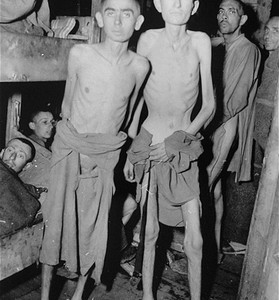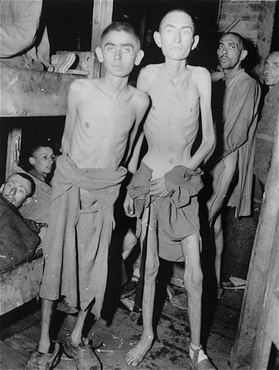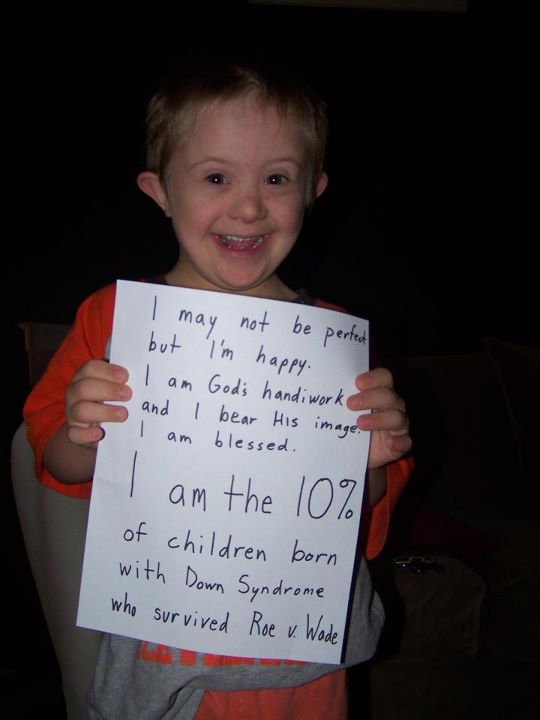Kids with Down Syndrome face a society disturbingly willingly to kill them. As the New York Times notes, “About 90 percent of pregnant women who are given a Down syndrome diagnosis have chosen to have an abortion.” For those who make it out of the womb alive, the danger isn’t over yet. Many are then forcibly starved as infants. From pages 99-100 of Edward Tivnan’s pro-euthanasia Moral Imagination: Confronting the Ethical Issues of Our Day, outlining the history of the euthanasia movement:
Despite significant advances during the 1960s in surgery, resuscitation methods, and intensive care, health professionals were deciding to let patients die every day. And these were not just the terminal, but also the very elderly and babies so horribly deformed and physically limited that no one could offer a prognosis of “a meaningful life” for them. Privately, doctors were saying, “Enough, let the poor thing die.” But it wasn’t until the 1970s that they began talking publicly about the reality of euthanasia.One reason for this was the “John Hopkins Case,” reported in 1973. After seeking some spiritual advice, the parents of an infant born with Down’s syndrome and duodenal atresia, an intestinal blockage that can be repaired, decided that a mongoloid child was better dead and refused permission for corrective surgery. Fifteen days later the child died of starvation.Most commentators were appalled by the simplistic standards of “deformity” and “suffering” applied in the case, and many disagreed with the parents’ decision. But such cases were not as rare as most people thought. In the prestigious New England Journal of Medicine, two doctors reported that among 299 deaths in the special-care nursery of the Yale-New Haven Hospital between 1970 and 1972, forty-three — 14 percent — were infants with multiple birth defects to their bodies, hearts, and central nervous systems. In each case, doctors and parents had agreed that the chance the infant had for a “meaningful life” was either extremely poor or hopeless; treatment was ended.
There is a sense in which this is perhaps worse than abortion or assisted suicide. There’s no illusion that the crying infant is anything less than human, yet he’s forcibly starved. If intentionally starving someone you know is (a) alive, and (b) totally reliant upon you for food and water isn’t murder, on what basis can we condemn the forcible starvation of the Jews during the Holocaust? What moral grounds distinguish those two actions?
As for the standard of “a meaningful life,” it’s garbage. Or more specifically, it’s not based on how happy those with Down Syndrome are, but on how uncomfortable Down syndrome makes the able-bodied. As Brown, Taylor, and Matthews explained in Down Syndrome Research and Practice:
As far as we are aware, no large study of the views of people living with Down syndrome about their quality of life has been conducted. Anecdotally, people with Down syndrome do not appear to consider their condition a source of suffering. Much of what effects quality of life for people with Down syndrome perhaps results from society’s behaviour towards them rather than necessarily the condition itself.
Anecdotal evidence supports the authors’ conclusions. From the Times:
Sarah Itoh, a self-described “almost-eleven-and-a-half,” betrayed no trace of nervousness as she told a roomful of genetic counselors and obstetricians about herself one recent afternoon.She likes to read, she said. Math used to be hard, but it is getting easier. She plays clarinet in her school band. She is a junior girl scout and an aunt, and she likes to organize, so her room is very clean. Last year, she won three medals in the Special Olympics.“I am so lucky I get to do so many things,” she concluded. “I just want you to know, even though I have Down syndrome, it is O.K.”
The sign carried by the little boy below says it all (h/t LifeNews):



I have a child with Down Syndrome. The 90% thing is tragic. I can understand why God wanted one in 1000 people to have Downs. It makes a society better. Abortion lets us play God. We think we can improve society by eliminating the weak members. It creates a deep confusion about what it means to be human.
I do wonder about refusing to do surgery. I think that is morally permissible if the quality of life would be very poor. As you point out, Downs by itself does not cause suffering. Still it is often accompanied by other serious problems. I know my little boy likely would have had a short and terrible life if we he didn’t get heart surgery. That surgery was not available 20 years ago. So I would want to know the whole story on this Johns Hopkins baby.
Not doing surgery when it would dramatically improve life, especially of a young child is against Catholic teaching. Its only permissible to refuse so called ‘extraordinary measures’ when, for example a patient is actively dying and inserting a feeding tube would not significantly prolong life, it would actually be a burden. Even though that was the case with Pope John Paul, he had a feeding tube inserted (he died that Saturday) I think it was a lesson to us to contrast with Terri Schiavo who was dehydrated to death that same week.
By the way, the Canadian Pediatric Society advocates letting ALL infants with Down syndrome starve, even if they don’t have atresia or heart defects. It was common practice at Christ hospital in Illinois. Randy, its a hard thing to accept, but we are not that different from Nazi Germany. Princeton Bioethicist Peter Singer advocates giving parents two months to kill their born baby if he or she is unacceptable, and has supported that ALL babies with Down syndrome be starved.
This is the legacy of abortion.
Read in my article for the National Catholic Register the survey by Dr Brian Skotko on the quality of life for Down syndrome as reported by the families.
http://www.ncregister.com/daily-news/the-fight-to-eliminate-down-syndrome-eugenics-at-work/
Joe, I have a book coming out on Down syndrome and eugenics which might interest your readers. “A Special Mother is Born” contains 34 stories by Catholic parents of special needs children who say how God blessed them through their children.
I will be discussing this book at the Catholic Information Center in DC on Nov 13 after noon Mass. I would be honored if you and Father would come over and say hello if you see me.
Leticia,
I can’t wait! I’ll do my best to make sure I’m free that day. I’m marking my calendar now. The book sounds incredibly edifying — is it available for sale now?
Joe
P.S. Father Andrew won’t be able to join us, because he’s a priest of the Archdiocese of Kansas City, Kansas, and that’s a bit of a commute. Are you going to be in the Midwest anytime soon?
Joe,
Great post. Reading it made me think of Tommy. While he doesn’t have Downs, his case is also illustrative of the principles you outline.
I still almost cringe to think of an incident that occurred while he was still in the NICU.
In a discussion on the possibilities of recurrence with siblings and things along those lines, one of Tommy’s neonatologists said more or less the following:
Well you could get pregnant and use ultrasounds to look for signs of recurrence and then terminate the pregnancy, if they were there.
This was at a Catholic hospital no less. I politely informed him that wasn’t an option for us. But I was dumbfounded he would suggest it. I know he wasn’t Catholic, but it was still shocking to hear.
That statistic shocks me. I can’t believe it! It blows my mind how careless doctors are with life sometimes.
Joe, looking forward to meeting you at my book talk at the Catholic Information Center in DC. I think I’ll be speaking on Monday Nov 14 at one, after the noon Mass.
Here is my blog where I am taking preorders for my book A Special Mother is Born. We expect the book to go on Amazon next week.
http://aspecialmotherisborn.blogspot.com/
The statistic (and 92% is what I’ve seen) is chilling. Our society is desperately sick.
Just last month, after a long wait, my wife and I brought home our newest daughters, two girls with Down syndrome from Ethiopia. After having the privilege of getting to know them better over these last several weeks, it is no surprise to me whatsoever that the devil would target those who, like them, have a little something extra. Their sweet souls are specially fashioned by God to soften and make tender the hearts of all who come in contact with them. (It has been nothing short of incredible seeing this in action every single time our new daughters meet someone new.) They are uniquely gifted to give love, without inhibitions, without conditions. I firmly believe these precious children are some of God’s most powerful instruments to heal our society which is quite literally hell-bent on choosing fear and death and hate over hope and life and love.
Leticia, thanks for all that you do. Brianna and I can’t wait to read your book!
And Joe, I’m going to shamelessly (pun intended, based on your blog’s title) take advantage of your wide readership and ask any and all of your readers who might be reading this comment to pray for our girls’ upcoming heart surgeries. Thank you.
Isn’t the west’s outrage at sex-selection strange in light of this?
–Andrew Lansley, the Health Secretary, said: “I’m extremely concerned to hear about these allegations. Sex selection is illegal and is morally wrong. I’ve asked my officials to investigate this as a matter of urgency.”
http://www.telegraph.co.uk/health/healthnews/9099511/Abortion-investigation-doctors-filmed-agreeing-illegal-abortions-no-questions-asked.html
If it isn’t a person, what, exactly are the Chinese doing wrong?
Robert Ritchie,
Good question. I’d be interested in hearing what abortion defenders would say to that. It does seem a bit like rank hypocrisy to me.